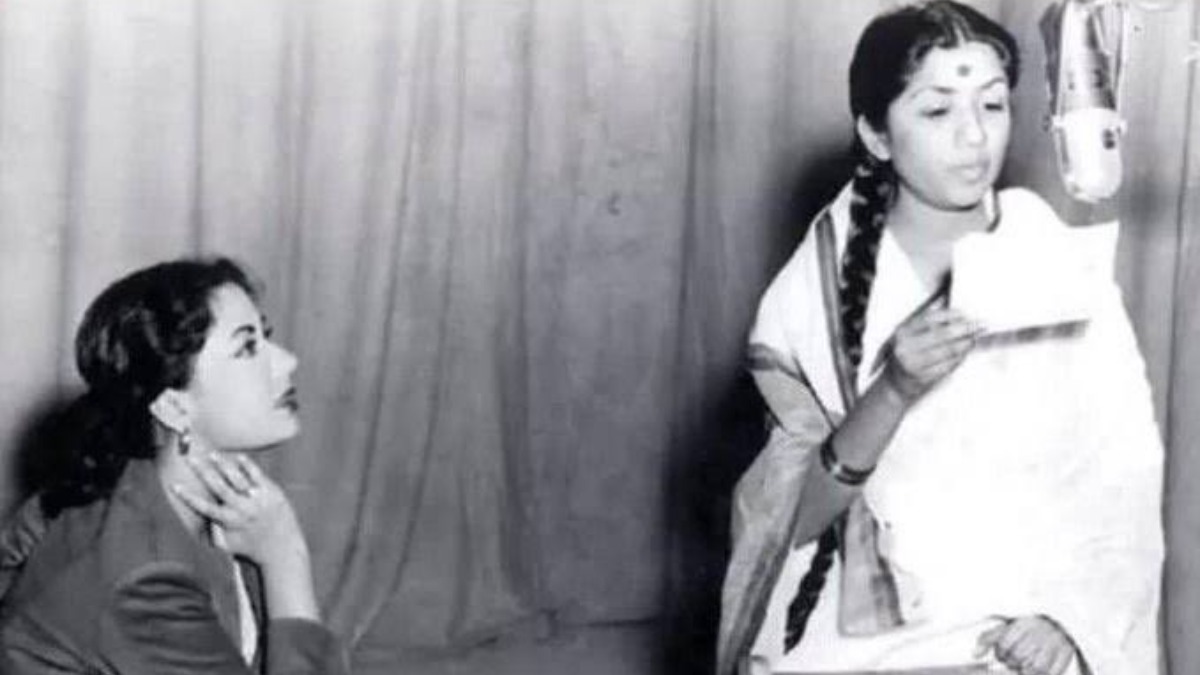Removed
Removed
Welcome to all the Music Corner Members and friends!
Every music composer uses the power of appropriate musical notes to convey feelings and emotions to the listener in order to make their raga-based compositions unforgettable.
Songs that express the circumstances, emotions, and outcomes in various ways can be heard in every Indian film, regardless of language. Musicians typically like to use classical ragas to accentuate their songs, as they were and still are quite popular!
Music has been used in movies for a variety of purposes, including embellishing a scene, emphasizing a sentiment, reflecting on a concept or action, providing catharsis, and acting as an internal monologue. It's also utilized both by itself and in combination with dancing in Indian films.

Traditionally, each classical raga has emotional content and symbolic connotations related to time, season, and mood. In Indian musical heritage, the raga is seen as a way to evoke particular emotions in the listener's heart.
The most frequently used ragas for raga-based movie songs are Yaman, Bhairavi, and Khamaj. Of course, movie compositions contain a great deal of ragas.
Let us start with Yaman. It is an evening Raga, Light, playful, and very aesthetic. It is a Lata/ Meena Kumari song, it is especially lovely to hear when it is pouring and will be much more captivating at night.
Yaman is one of the most widely used ragas in Indian classical music, and it is known for its simplicity and flexibility. Many Bollywood composers have used this raga to create some of the most iconic songs in Indian cinema.
You can share any classical raga-based Indian film music [any language] songs here.

Song: Mausam Hai Aashiqana
Movie: Pakeezah (1971)
Actor(s): Meena Kumari, Raaj Kumar, Ashok Kumar,
Singer(s): Lata Mangeshkar
Music: Ghulam Mohammed
Lyricist: Kamal Amrohi
For more raga based songs --Res


Jyoti Kalash Chhalke is a testimony to the musical genius of Sudhir Phadke and Lata.
At first, Lata Mangeshkar was hesitant to sing this song due to a miscommunication. Fortunately, Pandit Narendra Sharma, a renowned lyricist whom Lata affectionately and respectfully referred to as "Pappa," stepped in and forced her to accept the job. Sharma wrote the song in his renowned pure Hindi, which is based on Sanskrit.
Lata’s soulful vocals turned Raag Bhupali based composition into a divine spiritual journey. On the silver screen, Meena Kumari provided the perfect visual backdrop—the loving matriarch offering her morning prayers, going around the Tulsi planted in her house compound .
It’s a song adorned with minimal but pleasing strains of sitar, violins, flute, and tabla. Starting off with a sweet, soaring aalaap and replete with delicate nuances, Lata’s sublime rendition brings out the true inner beauty of the tune and of the words that mean:
‘‘The glowing pitcher of light overflows /
As the glorious morning dawns on this world /
Showing off its pink, red, and golden-colored clouds /
And a cool shadow of peace and happiness envelops all beings. ”
(Source: Google)
It’s a song that calms one’s troubled mind with its serene imagery and message.
Song: Jyoti Kalash Chhalke
Film: Bhabhi Ki Choodiyan
Year: 1960
Composer: Sudhir Phadke
Lyricist: Pt. Narendra Sharma
Interesting thread. I learnt something new today. Thanks 
Raags not just pleasing to the ears - the singer itself is transported into a deamflumous surreal zone where his soul transcends his body to reach an idyllic state 🎉
Originally posted by: Viswasruti
Jyoti Kalash Chhalke is a testimony to the musical genius of Sudhir Phadke and Lata.
In the Sudhir Phadke Appreciation Thread, I shared his performance of the same song.
Bhābhī Kī Cūḍiyāṃ was a remake of the Marathi movie Vahinīñcyā Bāṅgaḍyā, for which also Sudhir Phadke was the music composer.
This song from the original movie, written by Shantaram Athavale and composed in Rāga Darabārī Kānaḍā, is sung by Sudhir Phadke himself.
https://www.youtube.com/watch?v=tPPRfPbVeTM
Lyrics
तू नसतीस तर, तू नसतीस तर, तू नसतीस तर
Tū nasatīsa tara, tū nasatīsa tara, tū nasatīsa tara
If not for you, if not for you, if not for you ...
तू नसतीस तर गेले असते रोप चिमुकले सुकूनवाकून
तू नसतीस तर केले असते कुणी तयावर अमृतसिञ्चन
Tū nasatīsa tara gele asate ropa cimukale sukūna-vākūna
Tū nasatīsa tara kele asate kuṇī tayāvara amṛta-siñcana
If not for you, a tiny sprout would have been withered and stunted.
If not for you, who would have sprinkled nectar on it for its revival?
तू नसतीस तर मिळता कोठून घरट्याचा हा रम्य निवारा
तू नसतीस तर मिळता कोठून पंखाखाली गोड उबारा
Tū nasatīsa tara miḷatā koṭhūna gharaṭyāçā hā ramya nivārā
Tū nasatīsa tara miḷatā koṭhūna paṅkhākhālī goḍa ubārā
If not for you, where would I have found this delightful shelter of a nest?
If not for you, where would I have found sweet warmth under a wing?
तू नसतीस तर कळली नसती कळ्याफुलांची कोमल बोली
तू नसतीस तर मिळली नसती मृदु शीतलता चांदण्यातली
Tū nasatīsa tara kaḷalī nasatī kaḷyā-phulāñcī komala bolī
Tū nasatīsa tara miḷalī nasatī mṛdu śītalatā çāndaṇyātalī
If not for you, I wouldn't have caught the tender speech of buds and blooms.
If not for you, I wouldn't have found the soft coolness within moonlight.
तू नसतीस तर कळले नसते जीवन म्हणजे अथांग प्रीती
तू नसतीस तर जुळल्या नसत्या गीताच्या या मञ्जुळ पङ्क्ती
Tū nasatīsa tara kaḷale nasate jīvana mhaṇaje athāṅga prītī
Tū nasatīsa tara zuḷalyā nasatyā gītācyā yā mañjuḷa paṅktī
If not for you, I wouldn't have known that being alive means deepest love.
If not for you, there wouldn't be rhyme in this song's melodious lines.
I have to add a word of praise for the poet, Shantaram Athavale, who also played the elder brother who raises the protagonist Vasudev. (The Marathi movie never reveals the personal names of Vasudev's Dādā and Vahinī, which is its homage to similar self-sacrificing brothers and sisters-in-law in every joint family!) The lyrics express Vasudev's love for a woman who has taught him to appreciate the romantic beauty of the world. At first, Vasudev thought of his Vahinī as a replacement for his mother, but by this point, reconciling with his wife for their child's sake, he is sensitive to his Vahinī's childlessness. The poet walks a fine line, avoiding explicitly maternal-filial words, and yet never sexualizing Vasudev's feelings for his ideal loving woman.
As clairvoyant Urmila waits for Shridhar, her air force pilot husband, to return after his reportedly fatal plane crash, the six seasons pass by in this song based on Rāgas Yamana, Kedāra, Sohanī, Vasanta, and Malhāra.
Song: Jīvalagā Kadhī Re Yeśīla Tū
Singer: Asha Bhosle, Ketaki Mategaonkar, Saee Tembhekar
Movie: Suvāsinī (1961)
Actors: Seema Deo, Vivek
Lyricist: Gajanan Digambar Madgulkar
Music: Sudhir Phadke
https://www.youtube.com/watch?v=hJDWdhHxV0k
https://www.youtube.com/watch?v=YX0m8FxWjx4
https://www.youtube.com/watch?v=KCqf8r8BYeQ
Lyrics
दिवसामागुनि दिवस चालले, ऋतूमागुनी ऋतू
जीवलगा, कधी रे येशील तू?
Divasāmāguni divasa çālale, ṛtūmāgunī ṛtū
Jīvalagā, kadhī re yeśīla tū?
Days after days are passing, seasons after seasons
Life's partner, when, man, will you arrive?
धरेस भिजवुन गेल्या धारा
फुलुन जाइचा सुके फुलोरा
नभधरणीशी जोडुन गेले सप्तरङ्ग सेतू
Dharesa bhizavuna gelyā dhārā
Phuluna zāiçā suke phulorā
Nabha-dharaṇīśī zoḍuna gele sapta-raṅga setū
Torrents soaked the earth and went
The blooming jasmine flower fades
Gone are seven-coloured bridges that joined sky to earth!
शारदशोभा आली, गेली
रजनीगन्धा फुलली, सुकली
चन्द्रकलेसम वाढुन विरले अन्तरिचे हेतू
Śārada-śobhā ālī, gelī
Rajanīgandhā phulalī, sukalī
Candra-kalesama vāḍhuna virale antariçe hetū
Autumn's spectacle came and went
The tuberose bloomed and faded
Like the moon's crescent, waxed and waned my innermost urges
हेमन्ती तर नुरली हिरवळ
शिशिर करी या शरिरा दुर्बळ
पुन्हा वसन्ती डोलू लागे प्रेमाङ्कित केतू
Hemantī tara nuralī hiravaḷa
Śiśira karī yā śarirā durbaḷa
Punhā vasantī ḍolū lāge prem'āṅkita ketū
In winter, well, no greenery remained
Frost-season makes this body weakened
Again in spring begins to wave the love-marked flag
पुनर् अपि ग्रीष्मी तीच काहिली
मेघावलि नभि पुनर् अपि आली
पुनश् च वर्षा लागे अमृत विरहावर ओतू
Punar api grīṣmī tīça kāhilī
Megh'āvali nabhi punar api ālī
Punaś ca varṣā lāge amṛta virahāvara otū
Yet again in summer, the same torpor
In the sky, a cloud-row has come yet again
And again, rain-season begins to pour revival upon my loneliness
Wonderful theme!
https://www.youtube.com/watch?v=lF55PGL6c6Q
Raag: Bhairav
Song: Jaago Mohan Pyaare
Movie: Jagte Raho
Artist: Lata Mangeshkar
Year: 1956
comment:
p_commentcount